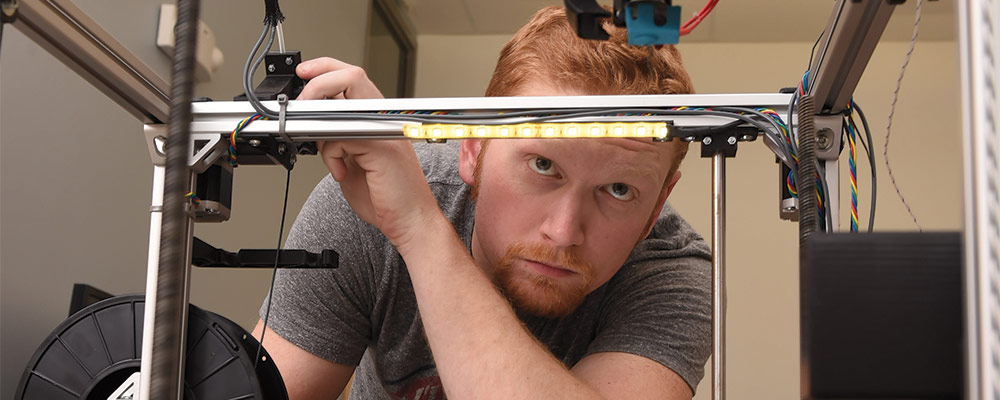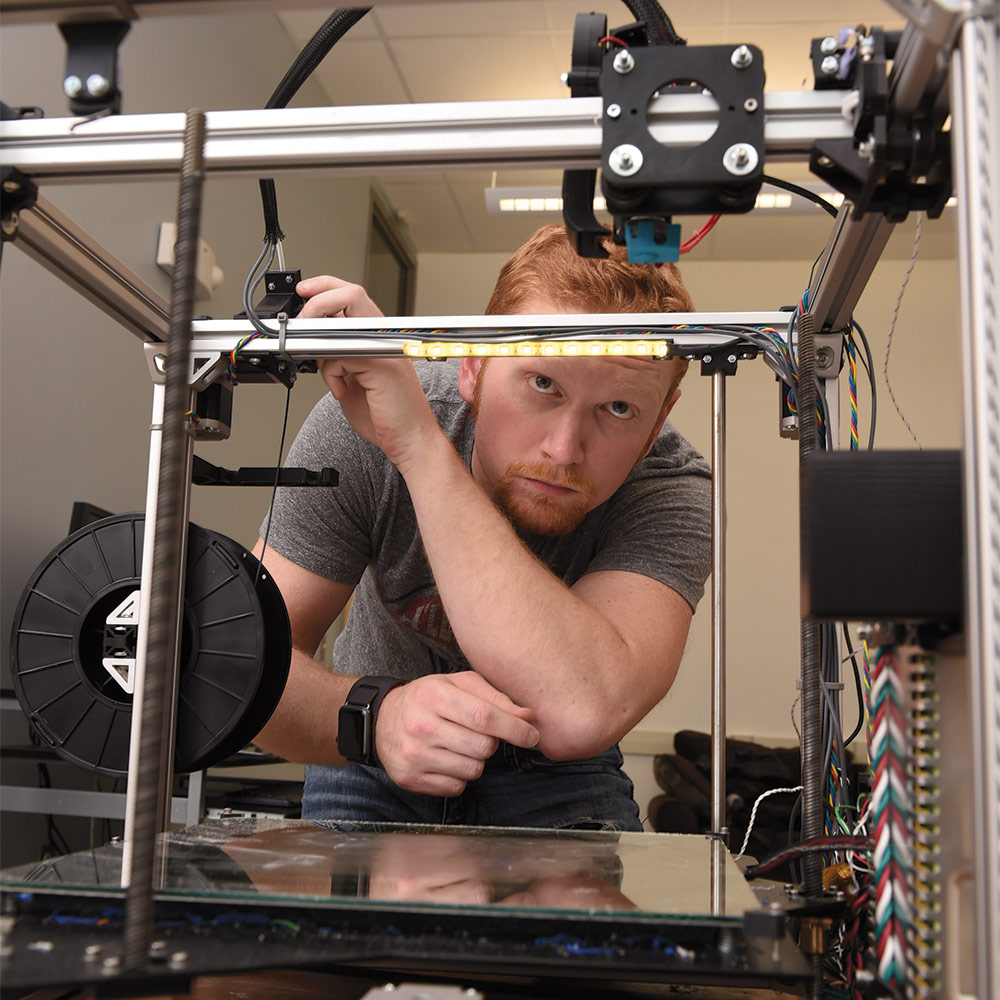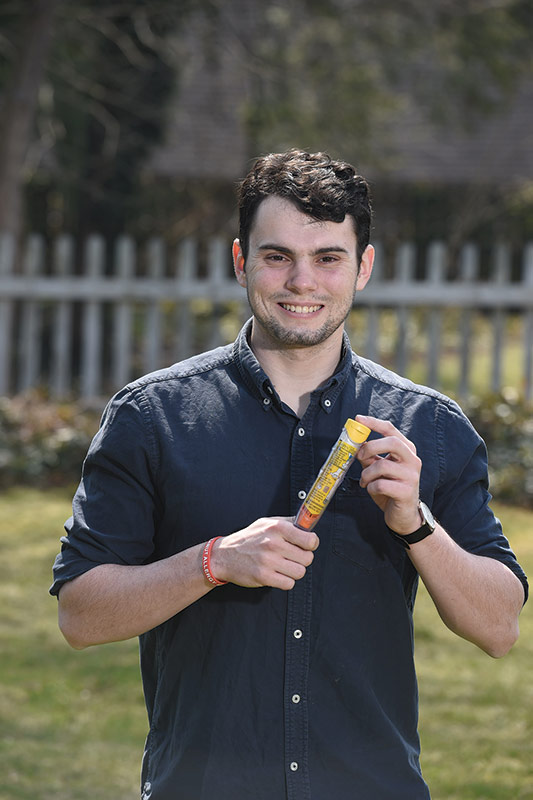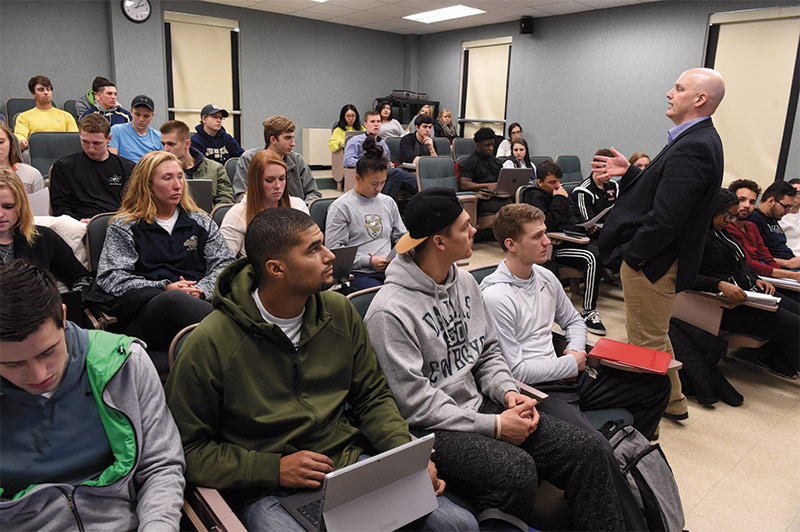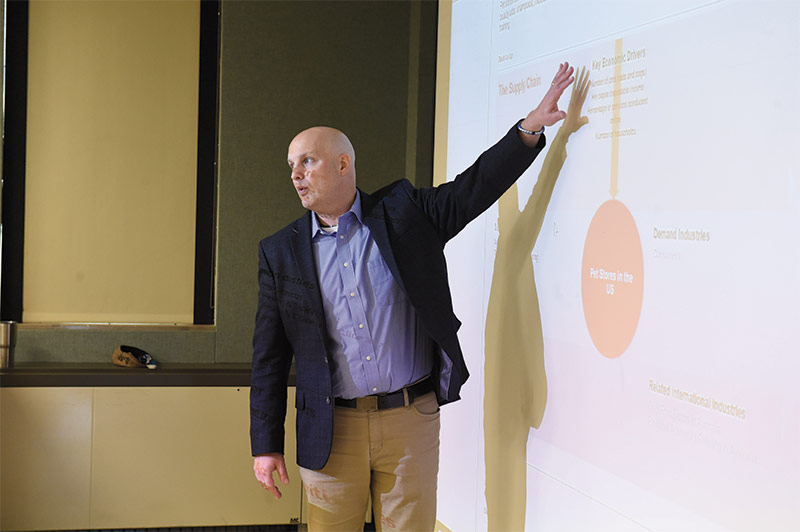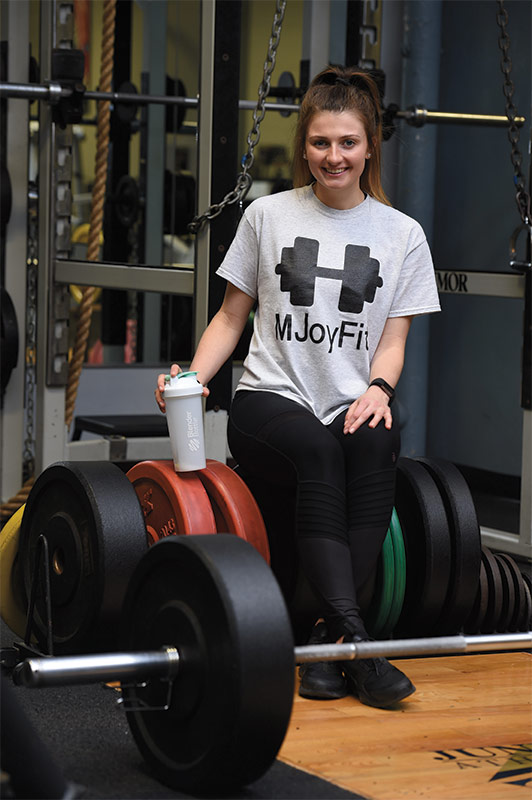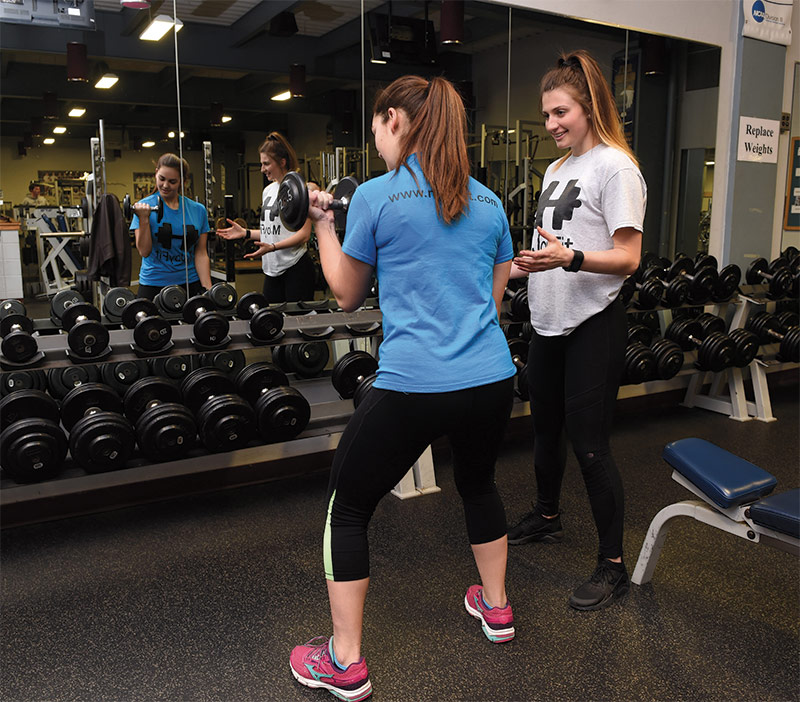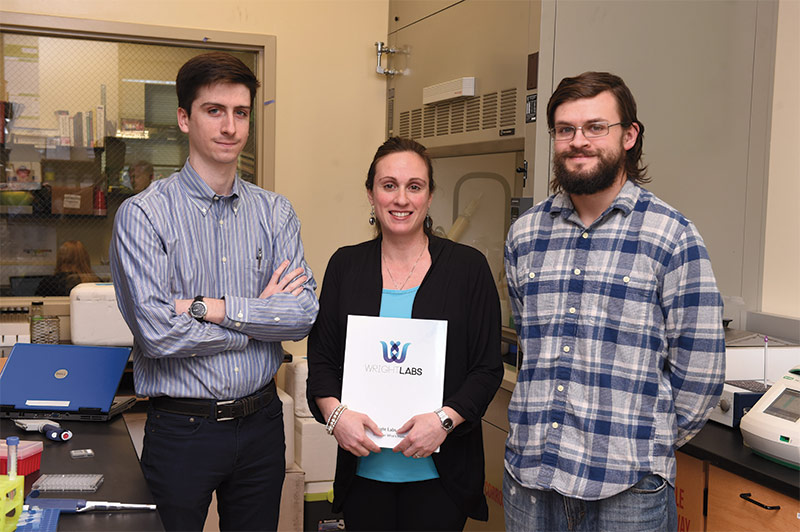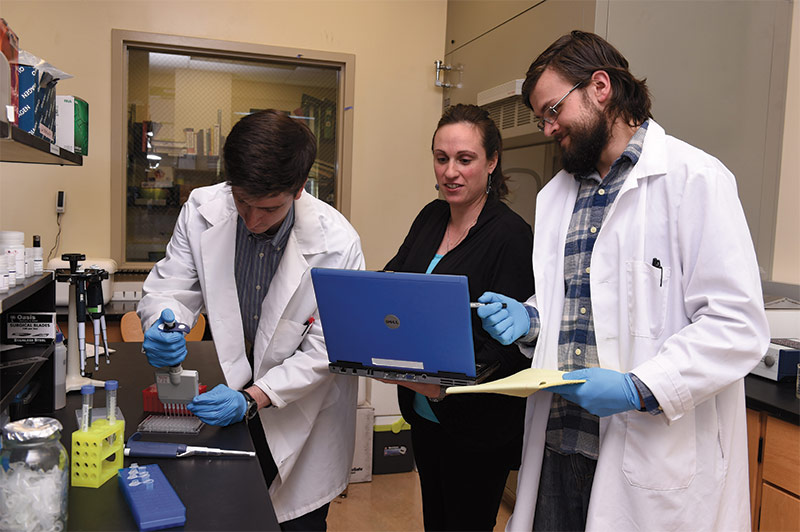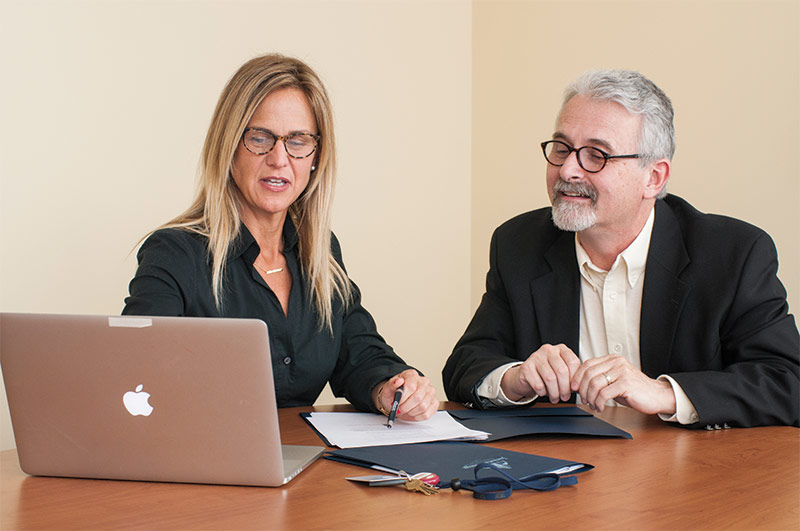“We wanted students to learn to start businesses based on examining a problem," says Terry Anderson, director of JCEL and assistant professor of entrepreneurship. "You're more likely to create a successful business if it solves an existing problem."
One lingering problem that the College wanted to remedy was the sustainability of student-created ventures. While JCEL in the past had nurtured a handful of successful businesses such as an ice-cream truck, a beef jerky product, and a mini-refrigerator rental business, few students were able to transition their work beyond the hot-house atmosphere of the business incubator.
"Most of the ideas coming through the entrepreneurial sequence were very similar and not unique—opening a restaurant or starting a sporting goods store—so we wanted to rewind the part about our students coming up with the big idea," Anderson explains.
Instead, the would-be entrepreneurs start their POE by taking Intro to Entrepreneurship and New Venture Creation, two courses that focus on opportunity recognition and research within the marketplace. The next step is the course New Venture Startup, which asks students to test-pilot their business ideas and determine if the light bulb over the entrepreneur's head gets brighteror dims. The student is assigned a mentor from the local or alumni communities and can apply for a Next Step Fellowship, which funds research and supplies upto $1,300.
If a student makes it through the process, the final leg of the journey is the capstone course, Entrepreneurship, or, running and growing the business. If the pilot program proves viable, the next phase means taking a detailed business plan to Anderson and the JCEL board of directors, which, if approved, can net the student up to $15,000 in funding.
The College has also tweaked how the students use the funding. In its earlier incarnation, students were expected to clock into an online workforce management platform, and work on their ventures during set hours. Instead, students are not paid by the hour but rather like a research stipend, where students can authorize larger payouts for materials, market research, or other expenses.
"The process helps students 'think' like an entrepreneur by embracing a new mindset about solving problems. Not all students will have successful startups, but the experience will make them better employees."Terry Anderson, director of JCEL and assistant professor of entrepreneurship
"We don't want them working inside the building 24/7," Anderson says. "We want them to be outside talking to customers, mentors, or researching the needs of the community. The process helps students 'think' like an entrepreneur by embracing a new mindset about solving problems. Not all students will have successful startups, but the experience will make them better employees."
The Accounting, Business, and Economics faculty also are intricately involved in the entrepreneurship sequence. Such courses as Behavioral Analysis of Organizations, Accounting, Marketing, and Economics are required.
Some students, such as Jane Shapiro '18, of Binghamton, N.Y., found more value in the business department's accounting and management courses. Shapiro transferred to Juniata from a community college and brought her idea for a community arts center with her. Envisioning a building with gallery, performing arts, studio, and store spaces, she researched the venture by talking to more than 50 artists and people in art-related careers. In the end she found that Huntingdon could not support such a space and scaled back her vision to start an art supply store in Huntingdon. She hopes to take the experience of running the store for her senior year and apply it to her art center concept in a larger city. "I've had this idea since high school and at Juniata I was able to combine art and entrepreneurialism," she says.
"I tend to be very impatient and JCEL's process taught be to be very patient and to focus on each step of the process. I want this to be a success for me and the College—because people using your product or talking about your idea is just the coolest thing."Maddie Joyce '18, Mechanicsburg, Pa.
The step-by-step structure of JCEL's process appealed to Maddie Joyce '18, of Mechanicsburg, Pa., who has used the Center's resources to start a personal training business and is currently researching an idea called ProClean.She identified a problem—the rank smell left in protein shake bottles (used by workout devotees) if they are not washed immediately.
Her solution: an easy-to-use cleansing tablet that can be dropped into the shake bottle with water, purifying and cleaning the bottle. "There is an existing product that is liquid that is used when you're home or doing dishes, but most people don't immediately wash their used bottles," Joyce explains. She pitched the idea at last year's Business Pitch Competition and placed second. "Everybody told me it was a great research opportunity," she adds.
This year, Joyce has created the personal training venture, MJoyFit, to help fund her larger idea. She also spent the summer talking to gym owners in Mechanicsburg to see if they thought the idea was viable. She has put a funding proposal together for the JCEL board.In the meantime, she also approached chemist Richard Hark and biologist Gina Lamendella on the feasibility of hiring four science students to develop the cleansing tablet as a summer research project.
"I tend to be very impatient and JCEL's process taught me to be very patient and to focus on each step of the process," she says. "I want this to be a success for me and the College—because people using your product or talking about your idea is just the coolest thing."
The new changes for the JCEL educational sequence seem to be paying dividends. When Anderson took over the program there were three Entrepreneurship POEs and the program now has 12. While JCEL has been part of the Juniata curriculum for a decade, the focus on problem solving is relatively recent.
Amy Chen '19 is looking to solve the problem of voter apathy. She's working on creating an "app" for smartphones, giving voters electoral information at the touch of a button. "You put in your ZIP code, address, and political party and you have access to bios, issues, and where your polling place is located," she says. "I think it's a way to increase voter turnout and educate voters."
Chen is still researching the concept and presented the idea for a Next Step Fellowship. The College's original vision for the Sill Incubator and JCEL included student housing and a myriad of student businesses that could be developed at the Sill Incubator and taken out into the real world, or taken over by younger students.
One such business that was taken over by a successor is Dimensions, a 3-D printing company owned by Isaac Fisher '19, a chemistry POE from Huntingdon, Pa. The business, located at the Sill Business Incubator, features two 3-D printers and a scanner, a $10,000 to $15,000 investment made by the previous owner through JCEL's Seed Capital fund. With threads of plastic inserted into the printer, the whole operation looks like a space-age sewing room. The machines are designed to fabricate or replicate what Fisher has designed or scanned into the computer. He can do anything from replicating a simple cap-nut to creating a door part for a Mercedes automobile. "I've done 3-D models of artifacts for archaeologist Jonathan Burns, so people don't have to touch the real artifact while he's showing it," says Fisher.
Fisher is planning to expand by starting computer-aided design (CAD) services and modeling services. He says more people are becoming familiar with 3-D printing, which bodes well for the business. He hasn't decided if he will continue past his graduation date, but he loves the venture's mix of science and mechanical ability. "The challenge is going to be understanding materials and how they are used in the printers," he says.
Juniata's immersion into entrepreneurial education was a natural outgrowth of a still-fervent trend in higher education inspired by the halcyon days of Silicon Valley companies such as Facebook, YouTube, and Twitter, all founded by college students (or college dropouts). Major universities and liberal arts colleges scrambled to develop incubators or innovation centers that would give business students an energizing new major and give administrators a brightly-lit, positive example of how colleges and universities can produce work-ready graduates.
Although student interest in entrepreneurial centers and starting businesses is still strong, entrepreneurialism in general is experiencing a bit of a downturn. According to The State of Entrepreneurialism 2015, a report published by the Kauffman Foundation, U.S. business creation is trending downward and the percentage of young people starting businesses is lower now than it was in the 1990s. Factors affecting the lower numbers could include the economy, relatively stagnant since the 2008 Great Recession, which prevents graduates from accumulating work experience, or student debt, which may require students to opt for steady salaries.
The most successful model for teaching entrepreneurship emerges from Stanford University, located (no surprise) in the heart of Silicon Valley. The culture of Stanford's StartX and other innovation programs "immerse faculty and students in interdisciplinary work and learning through problem solving," according to a 2015 article by Beth McMurtrie in the Chronicle ofHigher Education.
Juniata's adaptation of elements of the Stanford model are obvious, but the Center's mission also includes responsibilities to develop and nurture businesses created by Juniata faculty as well as entrepreneurs in Huntingdon or surrounding communities.
Although few faculty initially found the time to take advantage of JCEL's facilities and the Center's status as a Keystone Innovation Zone (which makes startups eligible for state tax credits and low-interest loans), more professors are exploring business opportunities.
For example, Jamie White, professor of physics, has established a United States office for MOG Labs, an Australian company. Started four years ago, the company markets lasers used in quantum optics labs at national laboratories and research universities across the United States. The small business has proved to be so successful that the company donated an $18,000 laser to the College in the 2016-2017 academic year. Chemist Richard Hark also has formed a company called Artifactual, which seeks to monetize his expertise at using scientific instruments such as Raman spectroscopes and laser-induced spectroscopes to analyze materials in artworks and historical artifacts.
Certainly the most advanced startup—in terms of technology and business reach—to emerge from JCEL is Wright Labs LLC, a genomics analysis company created in 2015 by biologist Gina Lamendella and Juniata graduate Justin Wright '14. The company specializes in microbial community profiling and meta-genome sequencing, which leverages Lamendella's research in tracing how microbes affect such environments as streams, soil, and the human digestive system.
Lamendella's career experience in tracing microbial communities in her labs at the University of Cincinnati, Lawrence Berkeley National Labs, and Juniata has given her a relatively rare skill set that she in turn has passed on to Wright and the dozen or so students that she mentors each year. Explained simply, Wright Labs' business model takes samples of water, soil, fecal material, or other substances and identifies the genetic material within the microbes of the sample. Then using gene sequencing technology, the company can "sort" through massive amounts of genetic data to see patterns or compare healthy microbial communities to damaged microbial communities.
"Justin and I thought this would be a nice little side business but we quadrupled in size from year one to year two."Gina Lamendella, Assistant Professor of Biology
"There are many labs that can identify the bacteria within an environment and will generate piles of data, leaving you to sort through the data to sniff out trends or answers," Lamendella explains. "Our company can generate the mountains of data and search within it to discover trends, answers, or new ideas. We got very excited about making this technology available to people who are making an impact in transitioning research into medicine."
The startup has attracted clients from all over the world, including Penn State Hershey Medical Center. "Justin and I thought this would be a nice little side business but we quadrupled in size from year one to year two."
So far the business supports Wright as a full time biometrician (as a reference, beginning biometrics specialists can make from $40,000 to $80,000 annually), and hired Christopher McLimans '17 soon after Commencement. In addition, the venture also provided summer research funding for five Juniata students last year and the same amount in 2017. Lamendella also was able to buy a computer pod for Juniata's supercomputer stack, a thermal cycler, and other equipment for the College's lab. Plus, the company made a substantial profit, which in turn was plowed back into the business.
Other faculty also collaborate with the business department's entrepreneurial curriculum by incorporating elements of startup principles into existing classes, funded by grants from the Coleman Foundation. Bethany Benson, associate professor of art, uses entrepreneurial principles as students organize the College's annual ceramics sale and Juniata's Empty Bowls event. Environmental scientist Uma Ramakrishnan used grant funds to bring in speakers to talk about business opportunities in natural resource management.
Cultivation of community resources also is a central mission for Juniata, and JCEL has helped local entrepreneurs get new businesses off the ground since it opened its doors. In partnership with Huntingdon County Business and Industry, Huntingdon County Chamber of Commerce, and St. Francis University Small Business Development Center, the Center works with small business startups, offering office space in the Sill Incubator, resources, and other help. Kristie Putt, assistant director of JCEL, manages the day-to-day operations for the Incubator, oversees the use of conference rooms or other public spaces in the facility, and recruits and retains businesses at the Sill Incubator. She also tracks data collection for all the businesses at JCEL, analytics that are important when businesses, the College, or JCEL apply for grants or other types of funding.
"My goal is to make JCEL a community, not just people who are next door to each other in a cubicle," Putt says. "I think we all operate in a neighborly fashion."
Currently, the Incubator's office space for community businesses is 100 percent occupied by such businesses as a local attorney, an insurance agency, Quinn Analytics (a database analysis firm), Dimensions (Fisher's 3-D printing), and computer-assisted design business, and a realtor.
One of the most recent local tenants is the Central Pennsylvania Clinic, a genetic testing facility for the company founded by Dr. D. Holmes Morton, a pediatrician who founded the Clinic for Special Children, in Strasburg, Pa., to track genetic diseases in the Amish and Mennonite communities. The company is utilizing JCEL's oversized "wet lab" space to prepare and analyze a variety of genetic tests. "The opportunities are enormous for the College," says Putt. "They want to be part of Juniata. They're willing to teach and to hire students. They are very willing to be part of the community."
Putt says the company, headquartered in Belleville, Pa., will gradually build its presence in the Center as it expands its testing and analysis business.
Putt also sees potential in cultivating creative entrepreneurs, people she calls "solo-preneurs" or "makers," and has used JCEL to establish a Huntingdon County chapter of The Rising Tide Society, which was established in 2015 as a meeting source for creative entrepreneurs. The society sponsors meetings called TuesdaysTogether, so small business owners could gather and compare notes with similar-minded entrepreneurs. The group is open to any type of business owner, but was originally aimed at creative business owners such as artists, photographers, bakers, or—as Putt puts it—"makers."
"I wanted our students to be a part of the TuesdaysTogether gatherings and to benefit from the relationships with our community business owners. So, I applied to be a leader and now Juniata is the first college chapter for The Rising Tide Society—the first to include both students and professionals," Putt says.
Like any new venture, it took a while for JCEL to find its footing, but the business sequence/incubator approach seems to be paying dividends for the College. Student enthusiasm for business creation can attract faculty participation and provide an outlet for faculty and community business ideas.
MJoyFit founder, Joyce, a former basketball player at Widener College and a current lacrosse athlete, transferred to Juniata specifically because she saw the Juniata Center for Entrepreneurial Leadership as a beacon drawing her in. "I saw this and the ideas I had been sketching throughout my childhood made sense. I want to apply this to what I want to do for the rest of my life."
"I wanted our students to be a part of the TuesdaysTogether gatherings and to benefit from the relationships with our community business owners. So, I applied to be a leader and now Juniata is the first college chapter for The Rising Tide Society—the first to include both students and professionals."Kristie Putt, assistant director of JCEL
